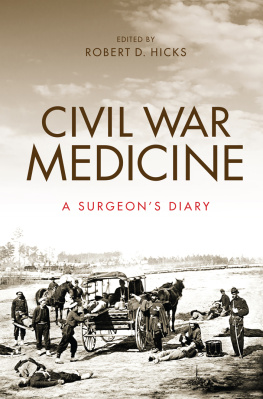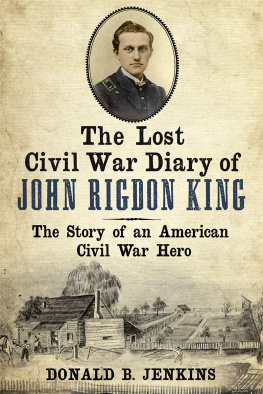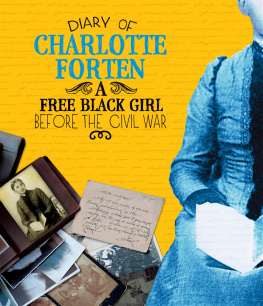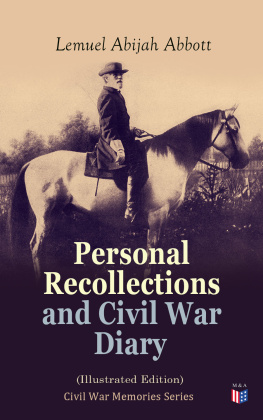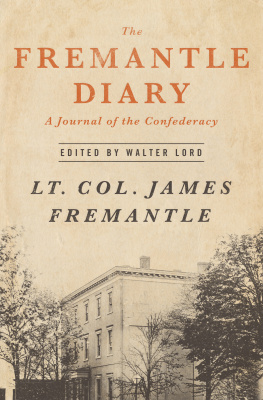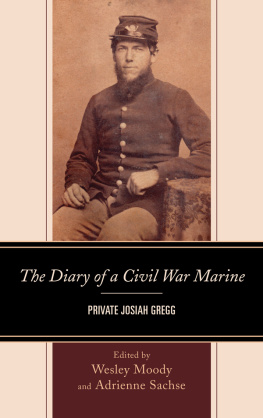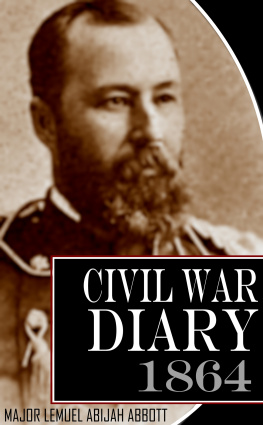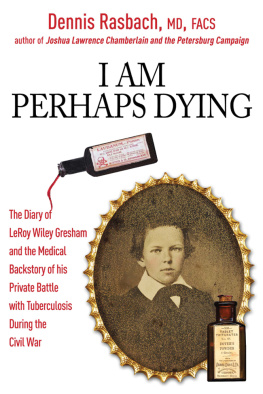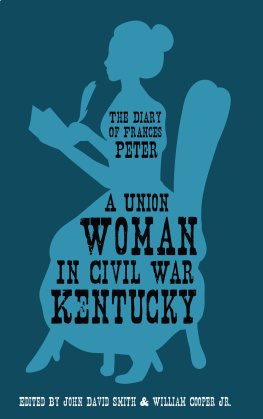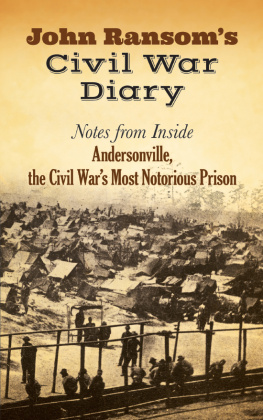IN DECEMBER 2012, I PRESENTED A TALK ON CIVIL WAR MEDICINE at the Worcester Historical Society in Massachusetts. A portion of the presentation concerned a letter written by Henry S. Huidekoper to Dr. S. Weir Mitchell, one of the countrys most famous nineteenth-century physicians. Huidekoper, during the Civil War a lieutenant colonel with the 150th Pennsylvania Volunteers, received the Medal of Honor for his actions at Gettysburg on July 1, 1863, which resulted in the amputation of his wounded arm. At the conclusion of the talk, a man in the audience raised his hand to say that Huidekoper was mentioned in the diary of his ancestor, Assistant Surgeon James Fulton of the 143rd Pennsylvania, which fought alongside the 150th. This man, Garrett G. Hollands, immediately offered to share what turned out to be an exciting discovery. Conversations and correspondence followed, and Garrett and Brenda Hollands provided me with a digital version of Fultons unpublished diary, along with a bundle of information concerning family genealogy, service records, and their own transcript of the diary. The Hollands family had also visited the locations of Fultons camps and battlefields. Without their generosity and early research, this book would not have been possible. They are due profuse thanks for their own extensive research, their recognition that the Fulton diary has significance, and their willingness to share it with the world.
This volume required a new, definitive transcript for scholarly purposes, and the usual business of tracking sources, obtaining illustrations and permissions, and correspondence with custodians of other collections with illuminating materials. Alex Tonsing, a Haverford College student, had the first go at transcribing the diary. Mary Ellen Donatelli, Wood Institute Associate, The College of Physicians of Philadelphia, was an indefatigable and enthusiastic assistant in all essential tasks, particularly editing the transcript. Retired literature professor Kathleen R. D. Sands tirelessly collaborated in producing the definitive transcript and in proofreading text. Kerry Bryan, a Wood Institute Research Associate and a diligent researcher, sallied forth to the Pennsylvania archives in Harrisburg to locate relevant Fulton records.
Many colleagues in the universe of archives and libraries extended a helping hand. The roll call includes F. Michael Angelo, University Archivist and Head of Historic Collections, Thomas Jefferson University; Constance Carter, Science Reference Services, and Kenneth Johnson, Duplication Services, both of the Library of Congress; Pamela Powell, Photo Archivist, Chester County Historical Society; Tabitha Cary, Carl A. Kroch Library, Cornell University; Natalie Shilstut, Presbyterian Historical Society; Denise P. Gallo, Daughters of Charity, Emmitsburg, Maryland; and at my own institution, the Historical Medical Library of The College of Physicians of Philadelphia, Caitlin Angelone, Chrissie Perella, and Emily Snedden Yates. David Smith, another Fulton descendant, shared images from a century-old, privately printed family history. Theresa M. Altieri Taplin, Archivist, The Foundations of The Union League of Philadelphia, opened her rich collection, one that deserves huge promotion for its Civil War value. Barbara Franco, Founding Director, Seminary Ridge Museum, Gettysburg, furnished leads to the identities of doctors mentioned in the diary by surnames only. Her own compilation of all physicians, Confederate and federal, who served at Gettysburg, will be a boon to scholarship when completed. I am most grateful to Diane Wendt, Deputy Chair and Curator, Medicine and Science, Smithsonian Institution, for allowing me to study the diary of Fultons colleague, Surgeon M. A. Henderson of the 150th Pennsylvania. Oberlin College student Sophie Everbach contributed help at an early stage of this project. Bill Nelsons wonderful maps give the topographic context to make the diary comprehensible. Tim Korba of RichArt Graphics enhanced and improved the photographs wonderfully.
I owe a huge debt to an A-list of scholars for their willingness to engage with the diary and provide the analysis and context requisite to circumscribing Fultons experience during the war. A huge shout-out to Shauna Devine, Margaret Humphreys, Randall M. Miller, James M. Edmonson, Guy R. Hasegawa, and Barbra Mann Wall. I hope that they found the Fulton diary a rewarding discovery. Their essays were critical to producing this book. Two anonymous reviewers made important criticisms that resulted in significant revisions and reorganization of material. Gold-star thanks to Indiana University Press for taking on the project. Ashley Runyon, Trade and Regional Acquisitions Editor, and Peggy Solic took the book in hand and ably ushered it forward. Nancy Lila Lightfoot, project manager, and Maya Bringe of Amnet, who oversaw copyediting and typesetting, drove it home. Their careful stewardship of the project speaks to the academic presence of Indiana University Press on the Civil War bookshelf.
I thank George M. Wohlreich, MD, President and CEO, The College of Physicians of Philadelphia, for his interest, advice, support, and encouragement.
NOTICE
The Health and lives of the troops being of the first importance to the State, the best professional talent will be demanded of those entrusted with their care. The examination by a Board of Surgeons, as directed by law, is intended to test the fitness of the candidate for this special military duty, and to establish a Merit Roll from which the Governor may select the officers of the Hospital Department. It is not to decide on his professional qualifications as a general practitioner.
RULES FOR THE EXAMINATION OF CANDIDATES
The Examination will be conducted as follows:
The Candidate will write out his answers to the printed questions, number them to correspond with the numbers of the questions, and sign his address in full (stating post-office), and hand them and the questions, in an envelope, to the Board as soon as called for.
He will also write on the envelope the name of the school and the year in which he graduatedhis age at present, and any hospital or other practical experience he may have enjoyedthus:
Presented by _______________
a graduate of _______________
aged_______________years.
A Surgeon (or Resident) of _______________Hospital during ______years.
In [illegible] practice _______________years.
Promptness in answering the questions, together with the handwriting of the candidate, and the evidence which he exhibits of general education, will all be regarded by the Board and enter into their estimate of his fitness.
After carefully inspecting the essays as handed in, the Board will report in writing to the Governor, the relative order of the merit of such as they deem worthy of a commission. Notice will then be given by the Governor to all candidates who are approved by the Board, and orders for duty issued by the Surgeon General as soon as regiments require medical officers. The successful candidate must in all instances await his commission in the order established by the Board. Personal solicitation for appointments will not be noticed. Delay in obeying an order to join a regiment will deprive the candidate of his right to an appointment. Promotion in the order of seniority of service will be given to Assistant Surgeons who prove themselves worthy of it.
A: SURGERY
1.What are the symptoms of a wound of the Lungand how would you check Pulmonary Hemorrhage?
2.How would you Trephine the Skulland what fills up the opening made by the Trephine?
3.What is a Hydrocelewhat an [sic] Haematocele, and what is Varicocele?
4.Describe the circular operation for Amputation of the Thigh.
5.Describe the dressing usually applied to a Fracture of the Femur.
6.Describe the method of reducing a Luxation of the Head of the Femur on the Dorsum Ilii.
Next page
